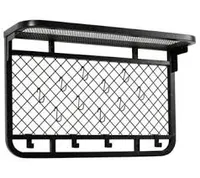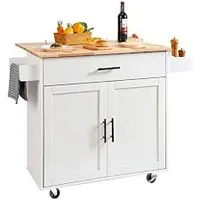5 ways to maximize kitchen storage without splurging on new cabinets
Streamline your kitchen storage with these five ways to maximize what you already have

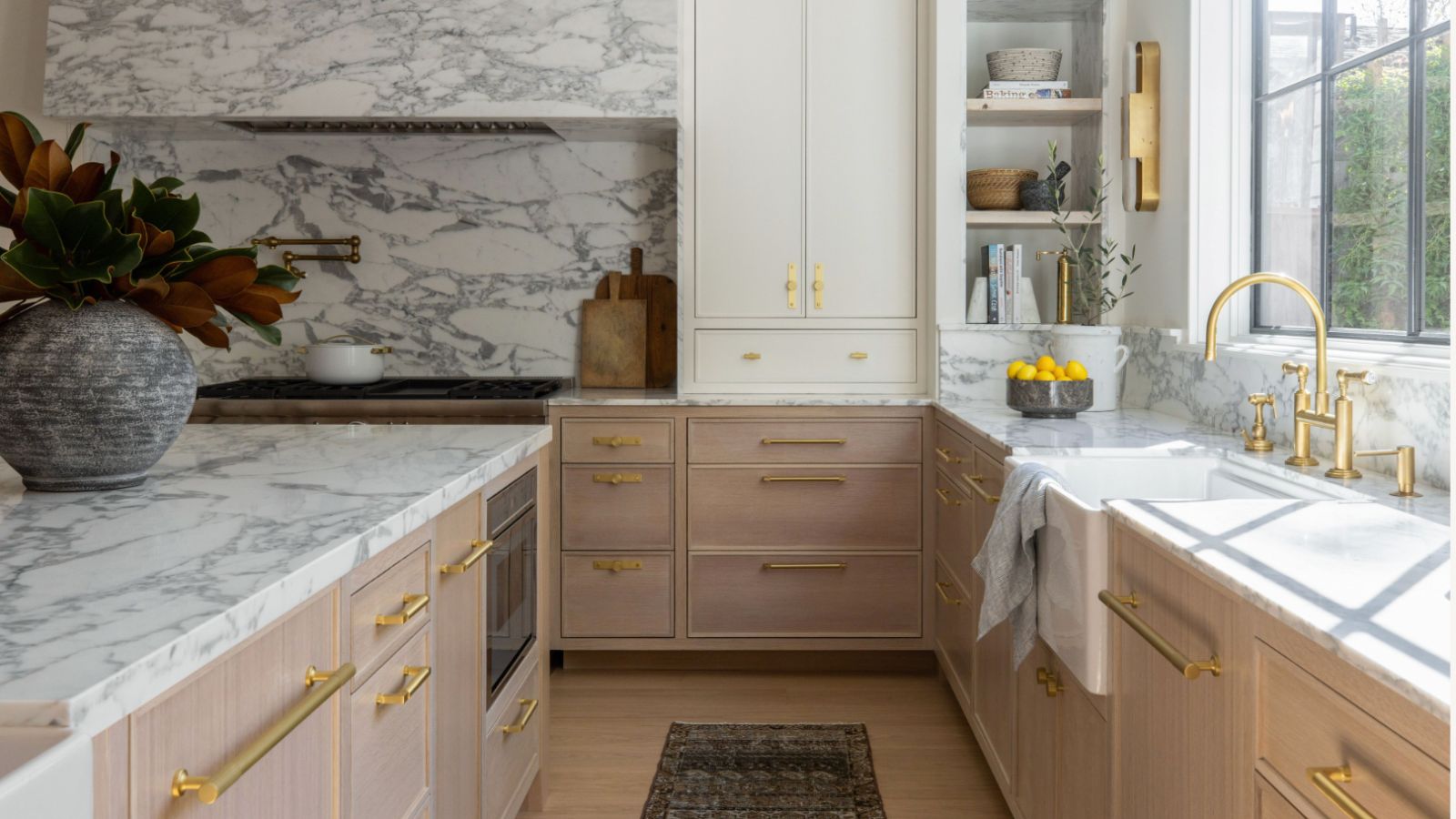
There is nothing more frustrating than fighting through piles of dishes or appliances when you run out of kitchen storage space.
If you don’t want piles of clutter on your counters, it can be hard to see what can be done to make the space more accessible without compromising on style.
Thankfully, expert designers and organizers have encountered this issue countless times before and have developed some great, tried-and-tested methods to maximize kitchen storage without having to change up your kitchen layout.
How to maximize kitchen storage
Although an ideal solution would be to completely remodel your kitchen to ensure that you have all the cabinet space and type to suit your lifestyle, this isn’t always feasible.
Luckily, even when you can't add or change out your cabinets, you can expand your storage and make the existing space work for you, saving time and stress when cooking.
1. Make the most of underutilized spots

'When organizing a kitchen, there are often several potential storage spots we pass up because they are not obvious. These areas, such as the backs of cabinet doors, the sides of tall units, or even the sides of refrigerators, can be excellent spots for hooks and magnetic strips to store the smaller, more awkward kitchen items that otherwise clutter up drawers,' says Kanika Khurana, principal designer and founder of Kanika Design.
‘For example, the inside of cabinet doors can serve as storage for measuring cups, towels, or even pot lids,’ she explains. ‘Hanging racks on the sides of cabinets can hold cutting boards or oven mitts. You can also make use of the space above cabinets by placing decorative storage baskets or containers to store less frequently used items.’
Design expertise in your inbox – from inspiring decorating ideas and beautiful celebrity homes to practical gardening advice and shopping round-ups.

Kanika is an interior designer based in San Mateo County. She loves working with bold colors and mixing different interior design styles to create a unique output every time.
2. Use pull-outs to double storage space
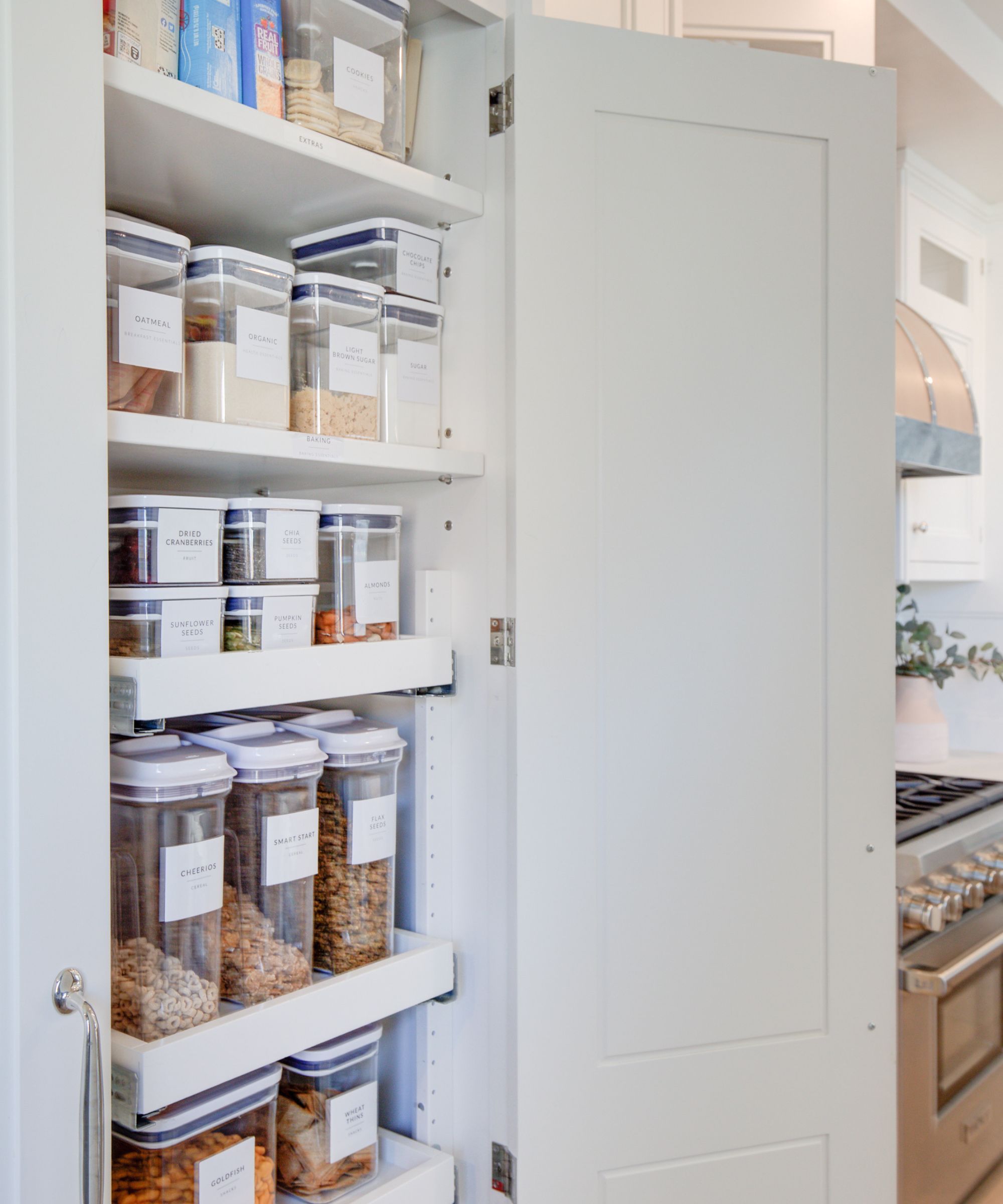
'Another common cause of wasted space when organizing cabinets in a small kitchen is having deep shelves that we cannot easily reach or see the back of. The solution? Using pullouts to double the accessible storage space,' suggests Bob Bakes, head of design at kitchen specialists Bakes & Kropp:
‘Intelligent storage is the key to maximizing kitchens of all sizes. We often integrate pull-outs, inserts, and dividers in our cabinetry to create the optimal amount of storage for our clients. For example, if you don’t have the square footage for a walk-in pantry, a pull-out pantry built into the cabinetry will provide a great deal of space for dry goods.’

Bob Bakes is head of design at Bakes & Kropp, and calls on his years of experience as owner and operator of a kitchen design studio in central London and his well-known former brand, Bakes & Company, based in Sag Harbor, NY. Bob has developed an expansive knowledge of the interior design process and professional project management skills throughout his accomplished career.
3. Use your walls wisely

One of the most common home organizing tips when struggling for storage is to use the available vertical space. For kitchen wall storage, this could mean using pegboards or hanging racks to store pots and pans and free up cabinet space for other essentials, says Artem Kropovinsky, interior designer and founder of Arsight.
‘Moreover, open shelving can accommodate regularly used items and make them accessible while adding decor,’ he adds.
Honey-Can-Do Wall Grid Storage | View at QVC
This handy wall storage unit has hooks for both small and large items and a convenient shelf for stacking or displays.

Based in New York, Artem Kropovinsky, founder of Arsight, has a decade of extensive and considerable global design experience. Prioritizing minimalism, sustainability, and authenticity, Artem, alongside his team of professionals, works on projects in the US and worldwide.
4. Use articulated pull-outs for corner cabinets
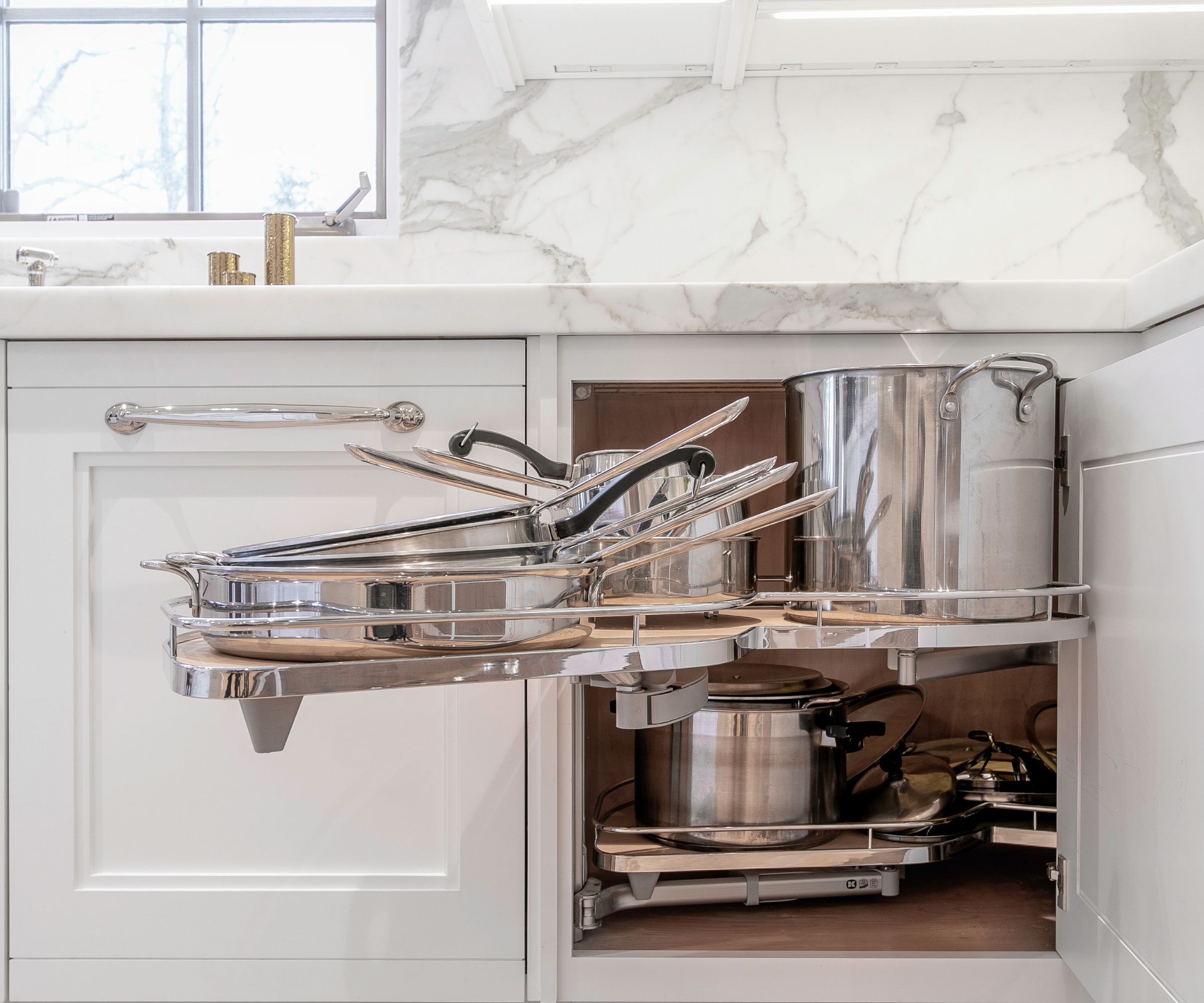
Organizing corner cabinets in kitchens is a nightmare. While you could store items you rarely use in the far recesses, it is far more efficient to install something like an articulated pull-out to access all of the space without having to crawl halfway in.
‘The blind corner is a regularly seen, yet rarely used, functional storage area. Because of a significant need to make every area of storage readily accessible in the kitchens, installing mechanisms to make blind corners more functional can be useful, says Bob Bakes, head of design.
‘We’ve installed round trays, more complex articulation shelves, and ‘magic corners’ where a rectangular set of baskets, one behind the other, move in sync to create access to stored items.’
5. Use freestanding storage
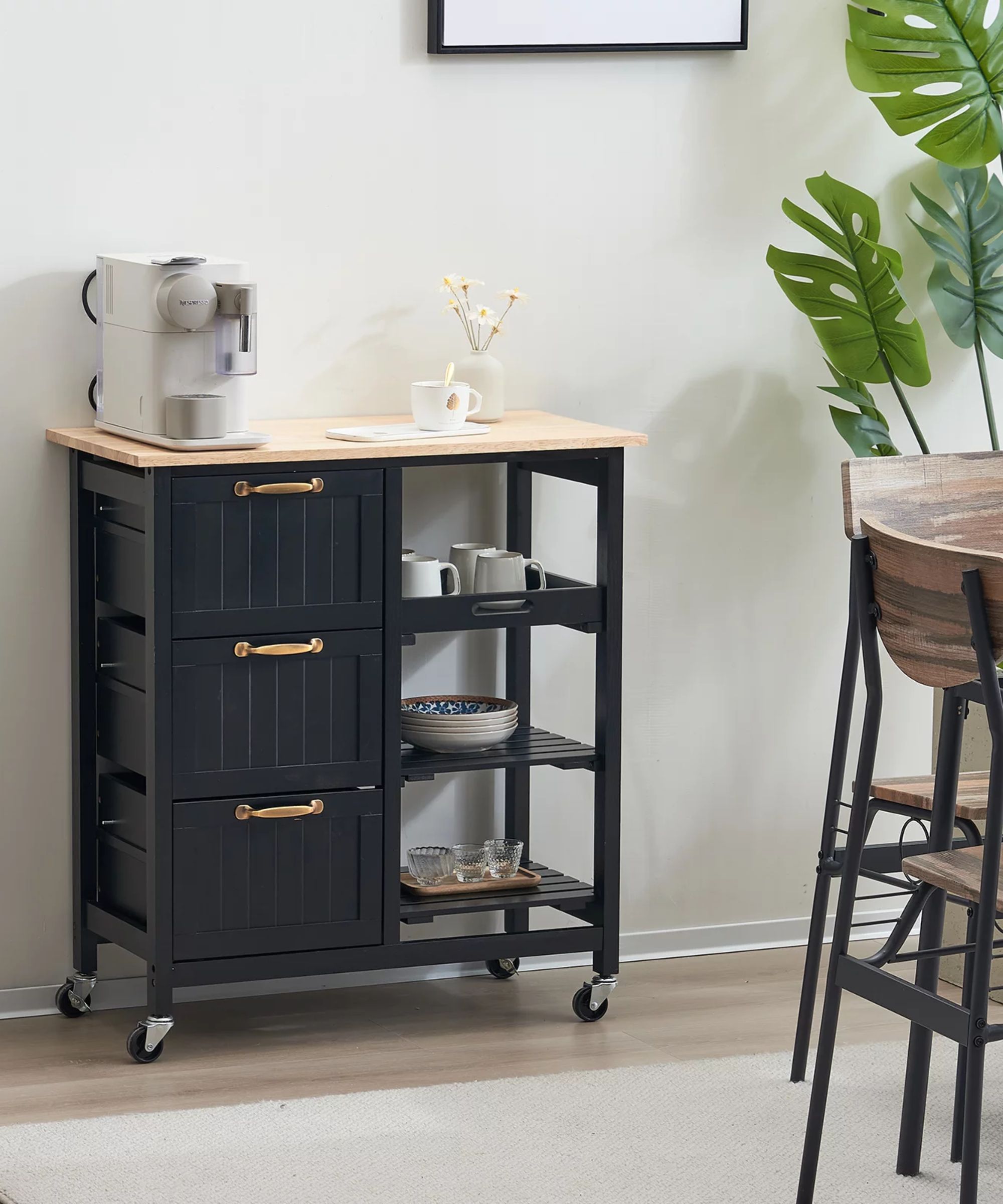
Not everything in a kitchen has to be anchored to walls or floors. If you are low on storage, Amélie Saint-Jacques, professional organizer, KonMari consultant, and founder of Amélie Organizes, recommends considering freestanding kitchen items such as a moveable island or even just a simple rolling cart to help add a little extra functional space:
‘If you have enough space, consider getting a portable kitchen island or one with shelving. These are great for storing bulky items, or you can put smaller items in bins. If you have room for it, a shelving unit or baker's rack also works wonders.
‘If you have a very small kitchen, a rolling tiered cart would be a better solution. It can hold small appliances, baking items, potatoes and onions, or backstock in general.’
Kitchen Island Cart on Wheels | View at Walmart
This free-standing kitchen island is small enough to fit into small kitchens but roomy enough to give you significant extra storage and countertop space. Perfect for those awkward, underused kitchen corners.

Amélie Saint-Jacques is a certified KonMari Consultant and professional organizer based in San Antonio with years of experience in professional tidying.
FAQs
How do I decide where to put things in my kitchen?
When laying out your kitchen storage, it can be helpful to place items close to where you use them most. For instance, you could put pots and pans in storage beside your cooker and leave plates and bowls in cabinets close to empty countertop space to make dishing up simpler.
How do you store plates and bowls without cabinets?
If you don't have the cabinet space for storing plates and bowls, the next best option is to use kitchen shelving to keep your plates easily accessible. Ensure that the shelf is not too high so that you do not risk dropping items as you take them down, and add a rail along the edge where possible to stop them from falling off should the shelf be knocked. Dust regularly to keep your plates and bowls clean, too.
If you find yourself organizing a kitchen with too much stuff, the obvious answer is to declutter items that you don't use or have better duplicates of. You might be amazed just how much space you can create by donating that ice cream maker you only used once or emptying your utensil drawer and thoroughly editing which items you actually use.

Chiana is Homes & Gardens’ kitchen appliances editor. With a lifelong passion for cooking and baking, she grew up experimenting in the kitchen every weekend with her baking-extraordinaire Mom, and has developed a great understanding of how tools and appliances can make or break your ideal relaxing kitchen routine.
